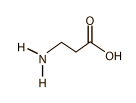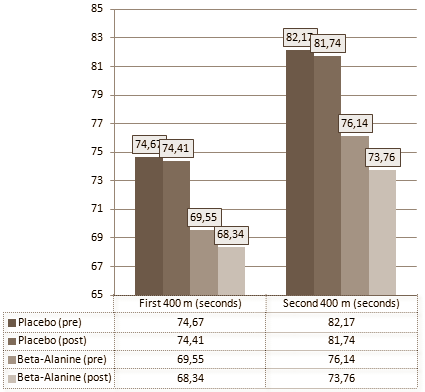|
Definition: "An ergogenic aid is any substance or phenomenon that enhances performance "
|
|
||||||||
17.03.2014 |
|
|
Beta-alanine shaves four seconds off runners' 800 metres
After dozens of human lab studies, sports scientists no longer doubt the ergogenic effects of beta-alanine. But are these effects so strong and specific that beta-alanine actually boost performance during competitions? This is the question that Kagan, who works at the University of Western Australia, set out to answer in his recent publications.
One of these publications appeared in August 2013 in the International Journal of Sport Nutrition and Exercise Metabolism and describes a study in which he gave well-trained rowers 6-7 g beta-alanine daily. [Int J Sport Nutr Exerc Metab. 2013 Aug;23(4):336-43.]
After four weeks of supplementation Duckers' subjects had reduced their time for the 2000 m by 2.9 seconds, as the table above shows. The effect was not statistically significant, though.
Duckers' experiments with runners were more successful. [Int J Sport Nutr Exerc Metab. 2013 Dec;23(6):554-61.] These subjects were also given 6-7 g beta-alanine for a period of four weeks. To be precise: 80 mg beta-alanine per kg bodyweight per day.
The supplementation had an exceptionally strong effect on the 800-m time, which decreased by 3.64 seconds, as you can see below. And yes, that was a statistically significant effect.
The positive effect of beta-alanine was particularly noticeable during the second half of this distance, Ducker discovered. If you know how beta-alanine works, which is by buffering lactic acid, that's not so surprising.
Ducker told in interviews that he was surprised at the amount of improvement that the amino acid induced. "3.6 seconds is a lot faster", he said. [sciencewa.net.au 24 February 2014] "In the 800m run I was expecting an improvement of maybe 1.5 seconds and so it was definitely a larger increase than what we were expecting."
"This result supports earlier research that have reported improved exercise capacity in tests lasting 60–240 s", writes Ducker in his publication. "Future research should investigate if these ergogenic effects exist in elite athletes performing 800 m running races or simulations and in other modalities of exercise, with efforts lasting a similar time period (i.e., 2–4 min)."
Source:
More: |
|




